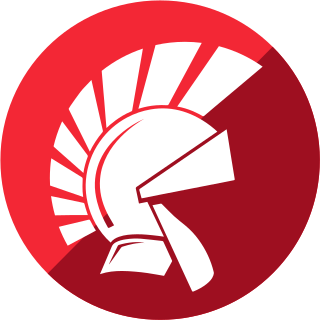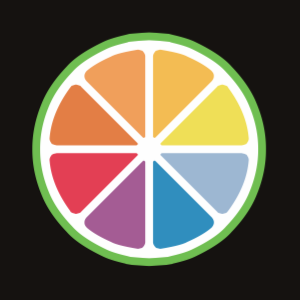In computing, cross-platform software is computer software that is designed to work in several computing platforms. Some cross-platform software requires a separate build for each platform, but some can be directly run on any platform without special preparation, being written in an interpreted language or compiled to portable bytecode for which the interpreters or run-time packages are common or standard components of all supported platforms.
In computer programming, an application framework consists of a software framework used by software developers to implement the standard structure of application software.

wxWidgets is a widget toolkit and tools library for creating graphical user interfaces (GUIs) for cross-platform applications. wxWidgets enables a program's GUI code to compile and run on several computer platforms with minimal or no code changes. A wide choice of compilers and other tools to use with wxWidgets facilitates development of sophisticated applications. wxWidgets supports a comprehensive range of popular operating systems and graphical libraries, both proprietary and free, and is widely deployed in prominent organizations.

Delphi is a general-purpose programming language and a software product that uses the Delphi dialect of the Object Pascal programming language and provides an integrated development environment (IDE) for rapid application development of desktop, mobile, web, and console software, currently developed and maintained by Embarcadero Technologies.

Fast Light Toolkit is a cross-platform widget library for graphical user interfaces (GUIs), developed by Bill Spitzak and others. Made to accommodate 3D graphics programming, it has an interface to OpenGL, but it is also suitable for general GUI programming.

Glade Interface Designer is a graphical user interface builder for GTK, with additional components for GNOME. In its third version, Glade is programming language–independent, and does not produce code for events, but rather an XML file that is then used with an appropriate binding. See List of language bindings for GTK for the available ones.

PyQt is a Python binding of the cross-platform GUI toolkit Qt, implemented as a Python plug-in. PyQt is free software developed by the British firm Riverbank Computing. It is available under similar terms to Qt versions older than 4.5; this means a variety of licenses including GNU General Public License (GPL) and commercial license, but not the GNU Lesser General Public License (LGPL). PyQt supports Microsoft Windows as well as various flavours of UNIX, including Linux and MacOS.
Borland Kylix is a compiler and integrated development environment (IDE) formerly sold by Borland, but later discontinued. It is a Linux software development environment based on Borland Delphi and Borland C++ Builder, which runs under Microsoft Windows. Continuing Delphi's classical Greek theme, Kylix is the name for an ancient Greek drinking cup. The closest supported equivalent to Kylix is the free Lazarus IDE package, designed to be code-compatible with Delphi. As of 2010 the project has been resurrected in the form of Delphi cross compiler for Mac and Linux, as shown in the Embarcadero's Delphi and C++ Builder roadmap. As of September 2011 with Kylix discontinued the framework for cross-platform development by Embarcadero is FireMonkey.

The FOX toolkit is an open-source, cross-platform widget toolkit, i.e. a library of basic elements for building a graphical user interface (GUI). FOX stands for Free Objects for X.

wxPython is a wrapper for the cross-platform GUI API wxWidgets for the Python programming language. It is one of the alternatives to Tkinter. It is implemented as a Python extension module.

PHP-GTK is a set of language bindings for PHP which allow GTK GUI applications to be written in PHP. PHP-GTK provides an object-oriented interface to GTK classes and functions. While PHP-GTK partially supports GTK2, GTK3 is not supported at all.

A graphical user interface builder, also known as GUI designer, is a software development tool that simplifies the creation of GUIs by allowing the designer to arrange graphical control elements using a drag-and-drop WYSIWYG editor. Without a GUI builder, a GUI must be built by manually specifying each widget's parameters in source-code, with no visual feedback until the program is run.
XRC, or XML Resource, or XML Based Resource System is a cross-platform XML-based user interface markup language used by wxWidgets. XRC allows graphical user interface elements, such as dialogs, menu bars and toolbars, to be stored as XML, which can be loaded into the application at run-time or translated into a target programming language and compiled.

JUCE is a partially open-source cross-platform C++ application framework, used for the development of desktop and mobile applications. JUCE is used in particular for its GUI and plug-ins libraries.

WaveMaker is an enterprise grade Java low code platform for building software applications and platforms. WaveMaker Inc. is headquartered in Mountainview, California. For enterprises, WaveMaker is a low code platform that accelerates their app development and IT modernization efforts. For ISVs, it is a consumable low code component that can sit inside their product and offer customizations.

Qt Creator is a cross-platform C++, JavaScript and QML integrated development environment which simplifies GUI application development. It is part of the SDK for the Qt GUI application development framework and uses the Qt API, which encapsulates host OS GUI function calls. It includes a visual debugger and an integrated WYSIWYG GUI layout and forms designer. The editor has features such as syntax highlighting and autocompletion. Qt Creator uses the C++ compiler from the GNU Compiler Collection on Linux. On Windows it can use MinGW or MSVC with the default install and can also use Microsoft Console Debugger when compiled from source code. Clang is also supported.

Ultimate++, also known as U++ or Upp - is a C++ rapid application development framework which aims to reduce the code complexity of typical desktop applications by extensively exploiting C++ features. Programs created with it can work on multiple operating systems and hardware architectures without the need to write platform specific code.

GTK is a free and open-source cross-platform widget toolkit for creating graphical user interfaces (GUIs). It is licensed under the terms of the GNU Lesser General Public License, allowing both free and proprietary software to use it. It is one of the most popular toolkits for the Wayland and X11 windowing systems.
wxPHP stands for "wxWidgets for PHP" and is a PHP extension that wraps the wxWidgets library, which allows writing multi-platform desktop applications that make use of the native graphical components available to the different platforms. It supports the three major operating systems: Windows, Linux and Mac OS X by using the PHP language. Applications are written in PHP language, and since it is an interpreted language, it does not require an intermediate compilation step in order to run the application, provided the PHP interpreter has the extension available.












